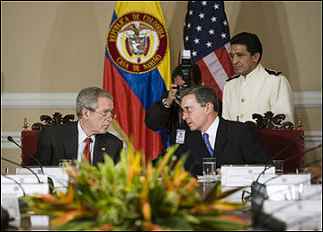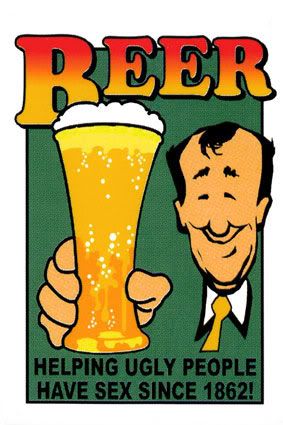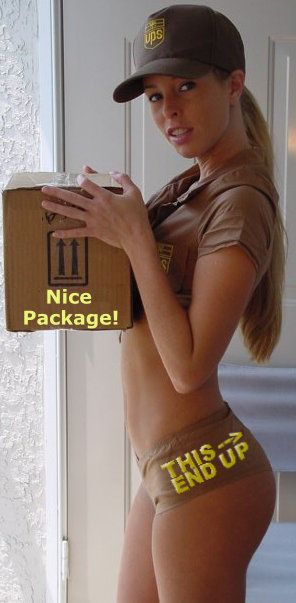
'Quality time' benefits Latin America and U.S.
by Terry L. Mccoy *
U.S. presidents do not usually spend "quality time" in Latin America. So the mere fact that President Bush went to Latin America in March, seeking to rebuild U.S. standing there, did not go unnoticed or unappreciated by our neighbors to the south.
Most important, Bush's visit did not come a day too soon.
He took office in 2001 promising to give Latin America top priority. Candidate Bush had declared if elected he would look south "not as an afterthought but as a fundamental commitment." Indeed, Bush's first trip abroad as president was to Mexico. Then came 9-11, followed by Afghanistan and Iraq, and Latin America fell off the Bush administration's radar screen.
The abandonment produced disappointment and disillusionment in Latin America. Venezuelan President Hugo Chavez fed off unhappiness with Washington to build a following for his leftist populist crusade.
So Bush's five days of "quality time" in five countries there last month was imperative. And I was fortunate to be in Latin America at the same time.
The choice of countries was interesting, as was the central theme he struck on the trip. So, too, was the fact that his Venezuelan nemesis Chavez quickly packed his bags and headed off to South America when it became clear that his neighbors were going to roll out the red carpet for the U.S. president.
Bush's first stop was Brazil, Latin America's largest country. Brazil fancies itself as the leader of South America, a status Chavez is angling to usurp for Venezuela. In a direct challenge to Chavez's petro-diplomacy of using Venezuela's oil windfall to recruit Latin American and Caribbean countries to join his bloc, Bush and Brazilian President Luiz Inacio Lula da Silva formed a partnership to promote ethanol as fuel (in which Brazil has the most advanced technology) to reduce dependence of the Americas on imported oil
Then came Uruguay. Here a left-leaning government has expressed interest in having closer ties with the United States -- now its leading trading partner -- because of unhappiness with the way Uruguay is being treated by its two big neighbors, Brazil and especially Argentina. The day that Bush arrived in Uruguay, the Argentine government, which has been friendly with Chavez, hosted the fiery Venezuelan president in Buenos Aires.
From Uruguay, Bush headed north to Colombia, Guatemala and Mexico. Colombia is the United States' closest ally in South America, and the second-largest recipient of U.S. foreign aid in the world as it fights a two-front war against drug traffickers and left-wing guerrillas. Guatemala and the other Central American countries have an enhanced relationship with the United States through a free-trade agreement.
Mexico, with which we share a 2,000-mile border, is the most important Latin American country for the United States. And nowhere has the disillusionment with U.S. policy been deeper. In welcoming Mexican President Vicente Fox to the White House on Sept. 5, 2001, Bush declared that the two neighbors were building a "relationship that is unique in the world, a relationship of unprecedented closeness and cooperation." Since then we have been at odds with Mexico over the Iraq war, drugs, border security and, most divisively, immigration.
In addition to addressing issues of concern to each of the five host governments, Bush reiterated a general theme at each stop: the persistence of poverty and inequality in Latin America. This concern with social justice and doing something about it is a wise and welcome shift in U.S. policy, one triggered by the Chavez challenge.
Clearly, Bush was in Latin America because of Chavez. And Chavez was there because of Bush. Bush faced protesters in the streets, while Chavez was fawned over by supporters. But the anti-Bush demonstrations were not that impressive, nor were the pro-Chavez shows of support. The evening that the Venezuelan president spoke at a rally in a Buenos Aires soccer stadium, I drove through the city and saw virtually no evidence of his presence.
Bush is not popular in Latin America, but surprisingly, neither does Chavez enjoy broad support. A regionwide public-opinion survey last fall found the two tied with approval ratings of only 39 percent. Only Fidel Castro came in lower, at 27 percent.
Bush's trip was a meaningful first step toward improving the standing of the United States and his administration among Latin Americans. Let's hope that he follows through.
* Terry L. McCoy is director of the Latin American Business Environment Program at the University of Florida. He was in South America at the time of President Bush's visit.















No comments:
Post a Comment